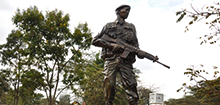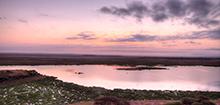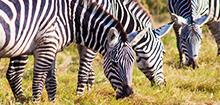Date Published:
Victims of human-wildlife conflict (HWC) in Elgeyio Marakwet County have been paid Sh. 28, 510,000, released by the National government through the Kenya Wildlife Service (KWS). KWS, the country’s lead wildlife conservation body receives and documents claims filed by HWC victims for the compensation process to commence.
The Chief Administrative Secretary in the Ministry of Tourism and Wildlife, Mr Joseph Boinet issued out the Sh. 28,510,000 cheque to compensate HWC victims in the County during a ceremony held on the premises of KWS outpost at Tot market in Kerio Valley.
With regard to Status of HWC compensation claims, 2014 to 2020 in Elgeyio Marakwet, Mr. Boinet said a cumulative total of 360 compensation claims were launched in the County during this period. Crop destruction contributed 21%, livestock predation 33%, human injury 31% and human death 5%.
Out of the18 human death claims, 11 were approved for payment by Ministerial Wildlife Compensation Committee (MWCCC) out of which 5 have been paid at a total amount of Ksh25M. The remaining 6 claims are awaiting funding totaling to Ksh 30M, while 2 death claims were deferred back to claimants for clarification of various support documentation to be provided. Five other claims were rejected due to lack of prescribed documentation.
A total of 111 claims on human injuries were launched to be considered for payment out of which 73 were approved by MWCC for payment. Out of these, 32 claims have been paid at a total of Ksh. 4,850,000 while the remaining 41 are awaiting funding totaling to Ksh 3,510,000.
“The ministry of Tourism and Wildlife and KWS work towards peaceful co-existence between human and wildlife”, said Mr Boinet, adding, “We appreciate that it is not humanly possible to compensate every form of destruction occasioned by wildlife, traditionally wildlife has always lived in our midst and therefore I urge for a blend of modern and traditional strategies to establish symbiotic relationship between human and wildlife”
The Principal Secretary, Ministry of Tourism and Wildlife, Prof. Fred Segor, who attended the event said the ministry and KWS have started a programme to provide water in wildlife protected areas, adding Tot area will be among the beneficiaries. Local leaders present, among them the County Governor Alex Tolgos and Marakwet East Member of parliament Mr. Kangogo Bowen promised to have area health facilities supplied with ant-venom to treat victims of snake bikes.
The history of wildlife compensation in Kenya dates back to 1976 with the enactment of the Wildlife Conservation and Management Act that provided for compensation for human injury or death, crop and property damage, including livestock depredation. The compensation scheme commenced in 1977 and was implemented until 1989. The scheme faced many challenges including lack of adequate funds from Treasury, cumbersome procedures for verifying compensation claims and in some cases outright corruption and unfairness.
The history is long, marked with a number of milestones over decades that saw the birth of the Wildlife Conservation and Management Act, 2013. This is the Act that is currently guiding the country’s wildlife compensation scheme for HWC. It may not be perfect, but many of its provisions are in tandem with the current social economic realities. A live lost through HWC cannot be compensated by anything else, but the compensation scheme takes into cognizance the fact that victims leave behind dependants who need to be supported.
The Law that guides wildlife management in the Country; WCMA Act, 2013 provides for the establishment of a County Wildlife Conservation and Compensation Committee (CWCCC). This committee comprises of a chairperson appointed by the Cabinet Secretary, and this is the County Commissioner, four persons who are not public servants nominated by community, an officer from KWS who is the secretary and other relevant technical officers at the County Government level. This committee reviews all the lodged claims and makes appropriate recommendations to the MWCC that validates and approves payment of the awards by the CWCCC.





